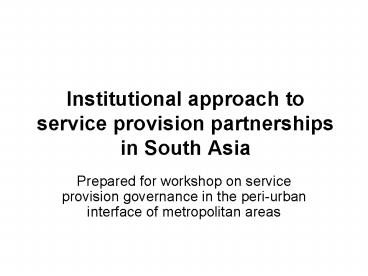Institutional approach to service provision partnerships in South Asia PowerPoint PPT Presentation
1 / 18
Title: Institutional approach to service provision partnerships in South Asia
1
Institutional approach to service provision
partnerships in South Asia
- Prepared for workshop on service provision
governance in the peri-urban interface of
metropolitan areas
2
Background
- Urban population growth in South Asia almost 13
million per annum - Backlog of services
- Many low-income areas poorly served.
- Many peri-urban areas outside the limits of
formal networked systems.
3
Background (2)
- Limited government capacity (both financial and
managerial) - Ineffective planning systems, particularly in
peri-urban areas - Investment required in India US13 billion per
year against availability US3.5 million per
year. (World Bank 1996)
4
Examples of the existing situation
Sewage pumping Tandlianwala Pakistan Showing
ad-hoc arrangements and poor maintenance
Faisalabad, Pakistan - The road to an area that
had been the focus for a DFID-funded upgrading
project
5
Examples of existing situation (2)
Area laid out by government as EWS (Economically
Weaker Section) housing project
Drain cleaning a constant need in flat towns
Machilipatnam, Andhra Pradesh, India
6
Responses to government failure
- Radical approach based on concession contracts
with large scale private sector providers. - This has made little process because of
- Lack of political will
- (and opposition from non-government groups)
- Fear of political interference
- Lack of information
- Faced with uncertainty, contractors are not
prepared to take on risk and the approach has
stalled.
7
Other forms of private sector involvement in
infrastructure provision
- Many low income households and small-scale
enterpreneurs already procure/ provide services
informally. - NGOs have often promoted and assisted such
efforts. - Municipalities enter into low-level PSP
arrangements with private sector providers
(Service contracts and management contracts for
specific facilities)
8
Examples of low-level PSP
- Service contracts for water tankering (Chennai
best known but common elsewhere) - Service contracts for street sweeping and solid
waste collection some larger but many small
scale and some involve womens groups. - Management contracts for OM of pumping stations,
tubewells, water treatment etc. - Provide and operate contracts with NGOs for the
communal toilet blocks Sulabh, Pune (SPARC and
Shelter Associates).
9
The key questions
- Do these informal and small-scale PSP initiatives
provide scope to improve service provision in
peri-urban areas? - Can they lead to lasting change?
- Can focusing on them help to create the
conditions required for more radical reform? - Paper takes a broadly institutional approach
to answering these questions.
10
What we mean by institutions
- The humanly devised constraints that shape human
interaction (North 1990) - Include both mental models that underpin the
structure of a society and organizational forms
that express relationships between individuals
and groups (Jenkins and Smith 2001). - Institutional approaches recognise that decisions
are path dependent (Hodgson 1999) - Useful to consider how systems might solve
problems and what might go wrong (Dudley 1993)
11
Barriers to increased informal sector involvement
- Informal systems depend on direct user provider
contract and so only provide private goods. - Difficult to ensure that services (a) are
sustained and (b) cover all areas. - Different mental models and procedures of
formal and informal sectors mean that
coordination between the sectors is different.
(Important when local services link with higher
order services)
12
Formal/informal institutional comparison
- Formal
- Works in accordance with plans (at least
officially) - Works in accordance with written standards and
procedures - Formal contracts
- Bureaucratic and hence inflexible
- Informal
- Demand led with little or no formal planning
- No written standards and procedures
- Informal, often unwritten contracts
- Opportunistic and flexible
So perhaps best to focus on initiatives that
already involve partnerships
13
Issues with current partnerships with private and
NGO sectors
- How can these initiatives be regulated?
- What importance should be given to competition?
- Are there options for moving towards higher
forms of PSP? - l
14
Options for regulation
- Develop formal regulatory framework Likely to
be difficult to have genuinely impartial
regulation. - Improved contract documentation (Chennai tighter
than Kurnool and Warangal scope for action to
provide standard improved documents. - Give monitoring role to service users
- Could light regulation (or no regulation) work
when service provider has public service ethos
and/or financial incentive to continue to provide
a good service?
15
How important is competition?
- Conventional wisdom is that competition leads to
reduced charges. - In India is that service contracts offer savings
of 40 and more compared with same services
provided directly by municipalities. - But many are based on standard rates. Even where
this is not the case, investigations suggest that
institutional arrangements involve cooperation
rather than price competition.
16
Competition and institutions
- Contractors may prefer stability with lower
profits to higher risk and lower profits. - Without changes in attitudes and assumptions,
relationships are likely to be different from
those assumed by planners. - Collusion may triumph over competition.
- Is the best response to encourage and facilitate
collaboration, at least in the first instance.
17
Possible steps on the road to reform?
- As contractors gain experience, move from
management contracts to local lease contracts
with contractor taking more risk but with an
incentive to invest money to improve service
delivery and hence improve revenue. - Gradually develop changed attitudes so that
people expect better service and are willing to
pay for it. - Then look at alternatives for further management
improvement, perhaps involving the private sector.
18
Role of government/ international agencies
- Fund research to develop a more holistic
understanding of how existing systems work. (How
they solve problems and how reality differs from
rhetoric). - Provide funding to test new approaches.
- Produce realistic assessments of initiatives and
publicise what works and what does not work.

